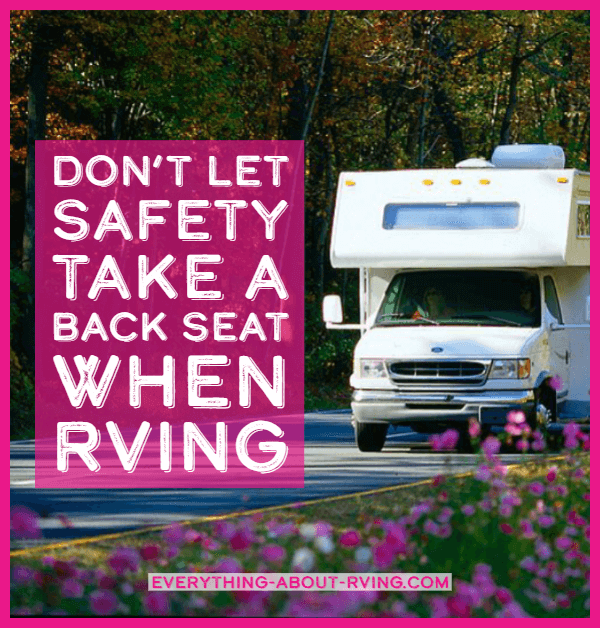Don’t Let Safety Take a Back Seat When RVing
"You should thoroughly inspect your RV’s basic systems before hitting the road"
Don’t Let Safety Take a Back Seat When RVing
by Miles Williams
For today’s baby boomers approaching retirement, “old age” no longer has the same connotations it did for their parents and grandparents. Indeed, retirement is now giving rise to a new and adventurous chapter in life. For many, it presents the opportunity to travel the country while staying at ”home.”
In fact, with the oldest boomer turning 60 this year, it’s not surprising that 44 percent of RV buyers are age 55 or older, according to Entrepreneur Magazine, creating a major boom in RV sales. But even on the road, these travelers can take steps to ensure that their ”home away from home” is safe and accessible for miles of enjoyable travel.
Getting Ready
According to goRVing.com, one of the industry’s leading resources on RV travel, you should thoroughly inspect your RV’s basic systems before hitting the road. In fact, make sure to check the following at least one week prior to your trip: tires, brakes, jacks, lights, oil, radiator, belts, horn, shocks, steering, windshield wipers and washers, lubrication and other vital equipment.
Pay close attention to the tires, ensuring they are inflated in accordance with proper inflation pressures for the load you are carrying. Overloaded tires are more prone to blow out. Also, keep tires of similar tread patterns and similar construction on the same axles.
Safety Inside and Out
Just as important as checking the mechanics of your RV is ensuring the interior is safe. Rugs, runners and mats should be adhered securely to the floor to prevent trips and falls. Steps into the RV should be free of clutter. A sturdy handrail should be easily accessible for additional support and safety when entering or exiting the vehicle.
Safety in the bathroom is just as important while traveling, too. Use non-skid mats or tread strips in the shower stall and in the bathroom to prevent the floor from becoming too slippery. Grab bars are important to have in the shower stall and next to the toilet for extra security and stability, whether the RV is parked or driving down the road.
Should there be a leak somewhere, (it can happen because your Motorhome is constantly in motion) be sure to air the entire unit thoroughly, before using any matches or open flame. Your Motor Home is equipped with a fire extinguisher. Use it if needed. Dirt and baking soda are also great and effective agents to fight a fire. Do not use water! It can be very dangerous. Water on a gas or oil fire results in a bigger fire. Water on an electric fire can result in death or injury.
When you leave the camping place, it is a good idea to check your packing list for all items. It also helps to check the members of your travel party. You'd be amazed, how many travelers forget wives and kids. Disconnect all wires and pipes, shut off appliances (except the refrigerator). Drive the Motorhome off the boards or other supports and stow away. O around the Motorhome campsite for any articles left there. Always allow a little more time than you think you will need, to get started. Check your planned route and rest stops.
Make showering on the road safer with an ADA-compliant folding mesh shower seat, such as one from Home Care by Moen. Weighing less than 4 pounds and folding to just 2 inches in width, this portable shower seat is easy to carry and store. It features a rust-free metal frame, non-slip rubber feet to prevent sliding and is made from a comfortable, quick-dry fabric allowing it to be put away and stored, shortly after use.
Your Next Stop
Once you’re on the road, make sure your safe travels continue at each stop. If you will be staying at a campground, try to arrive a few hours before sundown to allow enough time to choose a campsite, inspect the area, and set up camp during the daylight.
A great campsite should have some trees or shrubbery for privacy and to provide shelter from wind or rain. Check to make sure there are no gullies or ditches that could become flooded in heavy rain or areas that could become slippery and muddy. While inspecting the site, clear away rocks or other debris that could cause trips and falls.
If campfires are permitted, build them in a spot where the flames won’t spread. And remember, from the time a fire is lit until it is put out, someone needs to watch it. Be sure to keep plenty of water nearby in case of an emergency. Use water and soil to put out fires completely.
All of these suggestions will help you get more enjoyment out of your time on the road … no matter where your adventure years may take you.
For more information on the Home Care by Moen line of bath safety products, visit www.homecare.moen.com or call toll free (800) 882-0116.
All items from the Home Care by Moen line of bath safety products are available nationwide at Lowe’s and at select home health and medical suppliers. - ARA
Do you have any suggestions or comments on this topic? You can add them to this page by using the comments section located below.
Return to the RV Lifestyle Articles page from the Don’t Let Safety Take a Back Seat When RVing page



